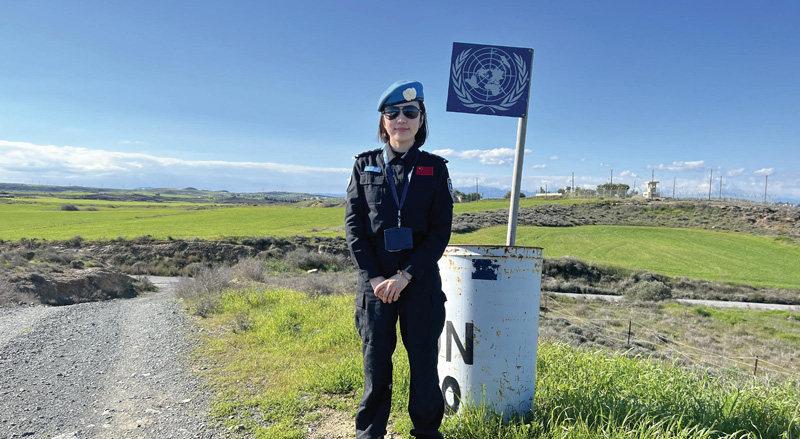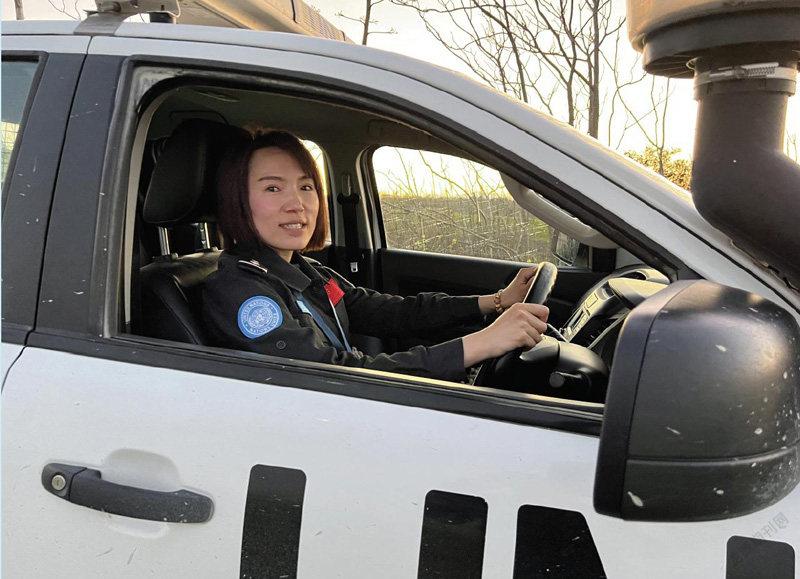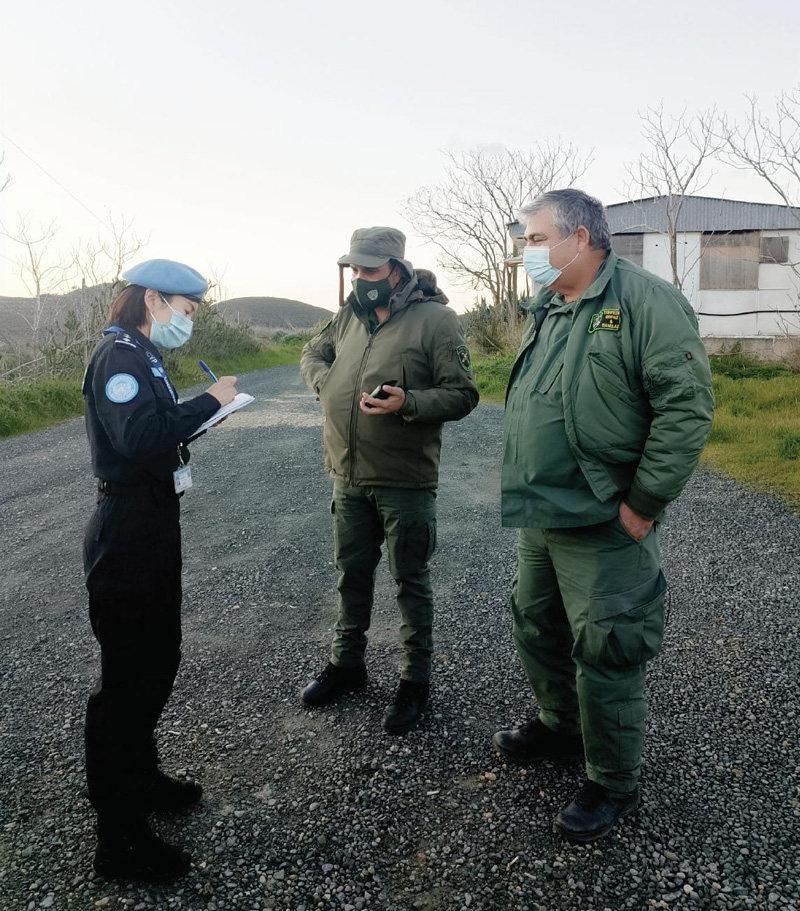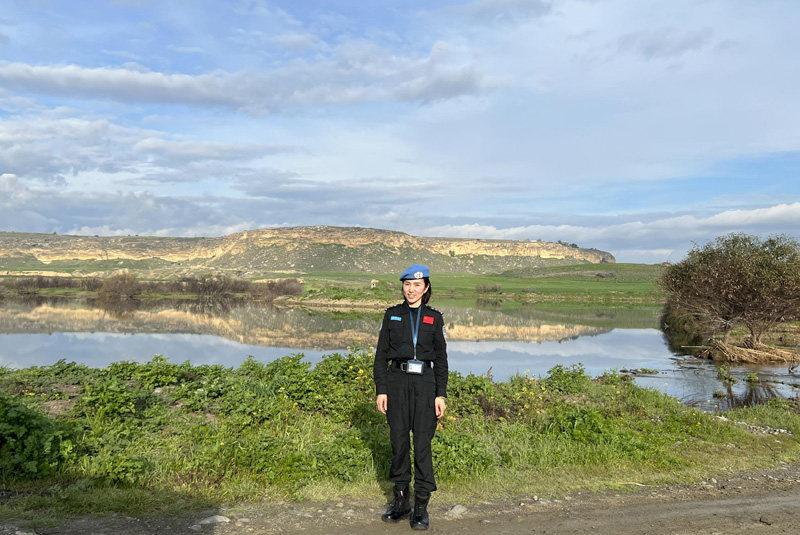我的第二次维和征程
金陶陶





来之不易的“二维”经历
我曾于2019年12月被派往联合国南苏丹任务区执行维和任务。南苏丹任务区是联合国最危险、卫生条件最差的任务区之一,经过一年的磨砺和成长,我于2020年12月底圆满结束维和任务后回到祖国怀抱。南苏丹的维和经历不仅提升了自我,更重要的是作为中国女性维和警察为保护当地妇女儿童权益作出了贡献。本以为我的维和经历已到此结束,却没想到又收到了赴塞浦路斯任务区维和选拔的通知。
接到通知后,我的内心是十分振奋的,因为可以再次为国出征,贡献自己的力量。然而,那时距离结束维和任务回家团聚还不满一年。念小学的儿子曾对我说,每天放学最期待的事情就是能见到妈妈。报名前我很犹豫,一边是祖国的召唤,一边是家人的不舍。在与家人沟通后,他们都对我的工作表示理解。在家人的支持下,我向联合国塞浦路斯任务区递交了自己的简历。在公安部国际合作局的精心指导下,经过认真准备,我于2021年10月通过了任务区选拔面试,并于2022年1月7日被派往塞浦路斯任务区再次执行维和任务。临行前,儿子抱着我说:“妈妈放心吧,我会好好学习,你要照顾好自己。”那一刻,我的眼圈红了。
当飞机抵达塞浦路斯任务区时,我对自己说,一定要珍惜来之不易的第二次维和机会,不辱使命。
初到塞浦路斯任务区
塞浦路斯于1960年独立,独立后由希族和土族两族组成联合政府,1963年两族发生武装冲突,1964年联合国维和部队进驻塞浦路斯。岛上土族集中居住在北部,希族则集中居住在南部,而联合国维和部队则驻扎在南北分界线控制区(即联合国缓冲区)。塞浦路斯分裂为南北两部分,南部为塞浦路斯共和国,由希族控制,并得到国际社会的承认;北部为土族控制,于1975年2月和1983年11月先后成立了“塞浦路斯土族邦”和“北塞浦路斯土耳其斯坦共和国”,只有土耳其承认。长期以来,联合国及国际社会一直在努力斡旋两族分歧,但塞浦路斯问题至今未果。2015年1月,中國首次向联合国驻塞浦路斯维持和平部队(联塞部队)派遣民事警察。目前,在塞维和警察大部分来自欧洲国家。这是一个政治高度敏感的任务区。这就意味着,维和警察不仅仅要有良好的专业素养及语言能力去独立处理好工作中遇到的会引发两族矛盾的敏感问题,也要维护好与其他国家维和警察之间的关系,因为我们不仅代表联合国维和警察,更代表的是中国警察的形象。
任务区第一周的入职培训,是展示中国维和警察精神面貌和专业素养的第一步,同期参加入职培训的还有来自爱尔兰和意大利的维和警察。除了每天要求自己出门前检查着装及必须准时到达培训地点外,我还要求自己在每节课堂上始终保持最好的状态。任务区几乎没有午休时间,每天课程结束后都会觉得特别疲惫,似乎用尽了浑身气力。虽然辛苦,但在课堂上专注的学习表现和专业的职业素养得到了教官和他国同事的一致好评。培训结束后是手动四驱车辆驾驶考试,我以优异的成绩通过了笔试、路考及山地越野考试。考官竖起大拇指对我说:“You are really good, Chinese lady(中国女警真棒)。”
巡逻任务中的挑战
培训结束,我被分到了四战区阿提诺(Athieou)派出所,主要工作是完成派出所所在缓冲区的巡逻任务,以及处理缓冲区内发生的治安事件。阿提诺派出所负责的巡逻路线是塞浦路斯任务区中最长的,从起点到终点需要两个半小时,巡逻一次往返需要五个小时,如遇到恶劣天气或者需要处理事件,则需要更长时间。每年11月至次年3月是塞浦路斯的雨季,今年雨季降水量很大,缓冲区内的道路十分泥泞,这对驾驶技术提出了更高的要求。
上班不久,就遇到了暴雨天气。我的搭档是一位来自俄罗斯的女警,她到任务区一年多了,经验丰富,对巡逻路线了如指掌。为了尽快上手工作,熟悉缓冲区道路及相关情况,我主动要求驾驶巡逻车辆,请她坐在副驾驶位为我讲解缓冲区情况。
她惊讶地问我:“Are you sure(你确定吗)?”在得到确定答复后,她点点头,坐在了副驾驶位上。在雨中泥泞的山路上驾驶皮卡车,我还是第一次,说不害怕是假的,忐忑的心情只有自己知道。但是,内心萦绕的声音却一直都是:我可以。
在遇到一个几乎呈四十五度角向下的山坡且右侧毫无防护的路段时,我用到了入职培训时学到的极端道路的驾驶技巧。那段路走得胆战心惊,握着方向盘的手能够感受到车轮一直在泥泞的道路上左右打滑。顺利下坡后,警服已经被汗水打湿。搭档对我说,经过今天,你能独立驾驶车辆在任务区巡逻了。那一刻,我体会到了什么是“一分耕耘,一分收获”。
具备熟练的驾驶技巧仅仅是缓冲区巡逻需要具备的第一个能力,更为棘手的问题是处理社区警务问题。
因塞浦路斯长期处于分裂状态,普通民众对一些问题十分敏感,这不仅仅需要维和警察具备丰富的警务经验,更要求我们具有高度的敏感性、良好的亲和力及语言能力。女警在处理该类问题上优势较为明显,因为我们更有耐心,更为细致。
第一次夜巡,我的搭档是一位来自其他国家的男警,返回途中遇到一辆可疑车辆进入缓冲区,当我们停车准备进行询问时,对方的情绪突然变得十分激动,对我们吼道:“This is our country ! You, go back to your own country(这是我们的国家,你,回到你的国家去)!”听到这句话后,我的搭档准备强制其下车,同时情绪也变得激动。我立刻劝阻了他,同时耐心与对方沟通,我告诉他,他的心情我们能够理解,这里的确是他们的国家,但同时也是联合国缓冲区,为了安全起见,请尽快驶离缓冲区。他听到以后,情绪逐渐稳定下来,然后驶离了缓冲区,避免了冲突升级。搭档对我竖起大拇指,说这样处理很棒。
任重道远的女性维和路
随着联合国任务区“Gender Mainstreaming”(性别平等主流化)进程的推进,越来越多的女性加入维和队伍。这给女性同胞们提供了更广阔的国际平台去展示自己,同时也带来了诸多挑战。除了高标准的体能、驾驶及警务素养要求,更大的困难的是一年多时间与家人的分离,尤其是与孩子的分离。对于想加入维和队伍的女性,根据自己经历整理出以下三点建议。
一是加強警务素养,提升执行力。维和任务区的工作难点在于把握与其他国家人员的相处技巧,不仅包括与来自不同文化的外国同事的沟通方式,更重要的是如何妥善处理涉及当地人的警务问题。
二是加强体能训练,提高抵抗力。维和任务区的卫生条件和医疗条件普遍较差,很多疾病没办法及时医治,尤其是目前全球新冠肺炎疫情仍然十分严重的情况下,对女性维和队员的身体素质提出了更高的要求。
三是注重心理建设,增强抗压力。长期封闭的维和任务要求参与人员能面对孤独和处理负面情绪,准备加入维和队伍的女性,要多注重自身心理建设,至少拥有一项兴趣爱好,用以缓解工作和环境的压力。
(责任编辑:张敏娇)
A Precious Second Chance
In December 2019, I was sent on a UN peacekeeping mission in South Sudan, one of the most dangerous regions with the poorest sanitary conditions for the peacekeeping forces. Thanks to my experience there, I felt tempered and improved upon my return to China a year later. More importantly, I felt proud of my part as a Chinese policewoman in protecting the rights and interests of local women and children. I was confident that my peacekeeping service had come to a full stop when I was informed of the selection of peacekeepers for the Cyprus mission.
I was very excited at the notification because it would give me another chance to serve my country. On the other hand, I had only returned from the last mission for less than a year. And my son, a pupil at a primary school, told me that what he looked forward to the most was seeing me after school. So I faltered. To answer the call of my motherland, or to be reunited with my family? That was the question. But my family showed understanding and support for me, so I submitted an application. Under the careful guidance of the International Cooperation Department of the Ministry of Public Security and through my meticulous preparation, I passed the interview in October 2021 and set off for Cyprus on January 7 the next year for my second peacekeeping mission. Before my departure, my son said, “Mom, don’t worry about me. I will study hard. You take care of yourself.” His words brought me dangerously close to tears.
When our airplane landed in the mission area, I steeled myself to cherish this hard-won chance and to prove my worth.
Arrival in the Mission Area
The Greek Cypriots and the Turkish Cypriots formed a coalition government following Cyprus’s independence in 1960. However, an armed clash broke out between the Greek Cypriots and the Turkish Cypriots in 1963 and consequently, the United Nations Peacekeeping Force in Cyprus (UNFICYP) was deployed in 1964. The Turkish Cypriots and Greek Cypriots live separately in northern and southern regions of the island divided by UN’s buffer zone, where the UNFICYP is based. The southern region controlled by the Greek Cypriots is called the Republic of Cyprus, which has been recognized by the international community; the Turkish Cypriots claimed the northern region as “the Turkish Cypriot state” in January 1975 and “the Turkish Republic of Northern Cyprus” in November 1983, which have been recognized only by Turkey. Despite the international efforts to mediate between the two sides, the issue has remained unsettled.
The Chinese government dispatched civil police officers to join the UNFICYP for the first time in January 2015. At present, the majority of the force is deployed by European countries. Politically, this is a highly sensitive area , thereby requiring the police officers to be equipped with skills and language abilities to deal with conflicts and issues on their own. In the meantime, we should build sound relationships with the counterparts from other countries because we represent not only the UN peacekeeping police force but also the Chinese police.
My performance at the orientation training in the first week showed the morale and professionalism of the Chinese police. Joining us were also policemen from Ireland and Italy. I deemed it imperative to be tidy in appearance and punctual in training. As there was no time for a nap at noon, I often felt exhausted at the end of the day. Despite the tough situation, I stayed focused in class and demonstrated a good command of skills that won me high praise from the tutors and colleagues from other countries. After the training, I received high marks on the written test, road test, as well as the cross-country test for driving 4WD manual vehicles. The examiner gave me the thumbs up: “You are really good, Chinese lady.”
Challenges on Patrol
After the training, I was assigned to the Athieou Police Station in Sector Four to carry out patrols and deal with security cases within the buffer zone. Our patrol route is the longest in the mission zone. It takes two and a half hours for a single trip, or five hours per round trip. Of course, even longer in bad weather. The rainy season in Cyprus falls between November and the next March. This year we encountered high precipitation that turned roads into muddy swamps, posing a great challenge on the road.
There were storms not long after I took the post. My partner was a Russian policewoman, rich in experience and familiar with the route. I, however, asked to be at the wheel so that she could tell me more about the buffer zone.
She asked me in surprise: “Are you sure?” I said yes, and she nodded and jumped into the passenger seat. Actually, it was my first time driving a pickup on a muddy mountain road in the rain. Honestly, it would be a lie to say I was not afraid, but a voice rung in my mind: “I can manage.”
On a 45-degree downward slope with no fence on the right, I applied the driving methods that I learned in training. It was a terrifying trip. I felt that the car was skidding on the slippery road as I clung firmly to the wheel. After the descent, I found my shirt bathed in sweat. My partner said, this trip made her believe that I could patrol independently form that day on. No pain no gain.
Driving skills are just one of the many abilities required for patrolling. Community-oriented issues are a greater challenge.
As Cyprus has been divided for a long time, the public is quite sensitive to certain matters. In this case, a peacekeeper has to be rich in experience, prudent in sensitive issues, amiable in attitude and proficient in language. Patient and meticulous, policewomen are in a better position to handle various cases here.
It was a policeman who I partnered with on my first night patrol. On our drive back, we spotted a suspicious vehicle into the buffer zone. We were pulling over to make an inquiry when that man barked at us in fury: “This is our country! You, go back to your own country!” Much irritated, my partner had intended to force the man out of the car. I stopped him and, in patience, told the local guy that we understood his feelings. This is his country but also a buffer zone, so he should better leave this area out of safety concerns. At this, he calmed down and drove away. My partner gave me the thumbs up in recognition of my calm diffusing of the otherwise escalating tension.
Suggestions to Women Peacekeepers
As an approach to “gender mainstreaming”, an increasing number of women have joined in the UN peacekeeping forces, stepping onto a broader international platform to demonstrate themselves. But it also brings many challenges. Highly demanding physically and professionally, peacekeeping keep them apart from their families, particularly their kids. In this light, I would like to share three of my observations with would-be women peacekeepers.
First, it is paramount to improve one’s professionalism and performance. The key to fulfilling duties lies in the way we work with people from other countries, including our colleagues with different cultural backgrounds, and more importantly, the local residents.
Secondly, one must intensify training for stronger physical resiliance. The sanitary and medical conditions are more often than not unsatisfactory in mission areas and many symptoms cannot be cured in a timely manner. Against the backdrop of the ongoing pandemic, physical resilience is all the more important to female peacekeepers.
Thirdly, mental resilience is imperative. Peacekeeping in an isolated environment requires the ability to fight loneliness and negative emotions. Women who plan to join the forces are advised to maintain their psychological health, and develop at least one hobby that can relieve them from the stress of work.
(Translated by Agnes)

